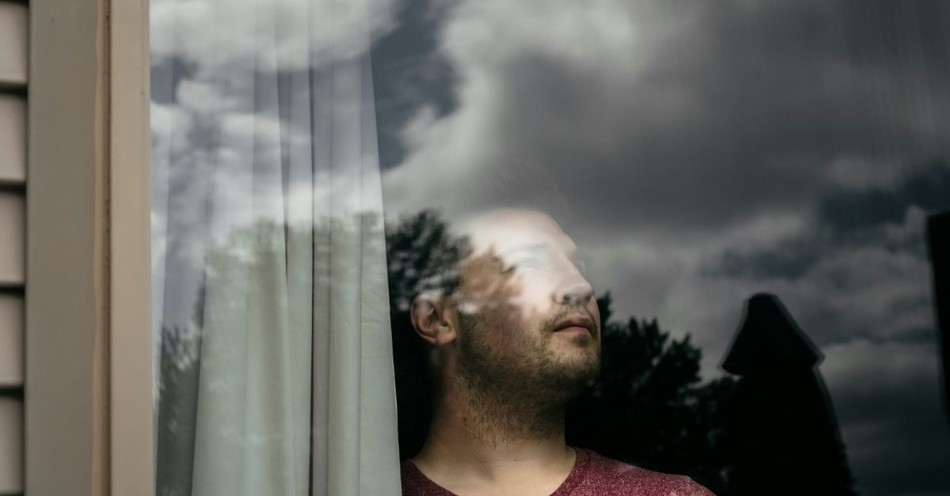God, where are you?
I have not been able to sense God’s presence with me for so long now. I have been asking this question repeatedly for months and months and months, and I am bone-weary from not hearing an answer.
Spiritual dusk, the time of night after twilight, is when we first start to feel like the presence of God is hidden, veiled, pulled back for some unknown, frustrating reason. It’s not yet completely dark. There is still some light, though fading. But these are the moments on your darkening path when you must squint to see the way forward.
In this season of disorientation, I don’t know what God is doing exactly, but I have a sense of God’s intentional hiddenness, God’s purposeful obscurity. God is hiding his face from me. Why? My theological fill-in-the-blank answer is that God wants to transform me somehow. But mostly, I have questions. No answers seem to be enough.
Yet, Scripture does give us examples of God’s obscurity . . . God concealing his glory or appearing in a dark cloud or in murky darkness (emphases added):
The people stood far off, while Moses drew near to the thick darkness where God was. Exodus 20:21, ESV
“You came near and stood at the foot of the mountain, while the mountain burned with fire to the heart of heaven, wrapped in darkness, cloud, and gloom.” Deuteronomy 4:11, ESV
“The secret things belong to the Lord our God, but the things that are revealed belong to us and to our children forever, that we may do all the words of this law.” Deuteronomy 29:29, ESV
How long, O Lord? Will you forget me forever? How long will you hide your face from me? Psalm 13:1, ESV
It is the glory of God to conceal a matter; to search out a matter is the glory of kings. Proverbs 25:2
Truly, you are a God who hides himself, O God of Israel, the Savior. Isaiah 45:15, ESV
“He reveals deep and hidden things; he knows what is in the darkness, and the light dwells with him.” Daniel 2:22, ESV
I’ll be the first to tell you that best practice biblical exegesis requires more than a simple word study or a few verses as “proof of concept,” but a sense of God’s hiddenness can be found throughout the Scriptures, throughout history, throughout our spiritual formation. I suppose I’m reminding us both of that, me and you, so that we don’t feel so alone or confused when God’s presence seems more like absence. There is some sort of divine precedence here. But the why and the where is God of it all? That, I still can’t answer.
I’ve been in spiritual seasons adjacent to this one before, seasons of lament brought on by illness and grief. Yet even in those seasons, I knew God’s withness with me. I knew Emmanuel’s presence. I felt God’s comfort.
This is different.
Something has shifted.
My relationship with God used to be different. Easier, perhaps. More naive in the best sense—trusting, guileless, childlike. I had a clear vision of what God was doing in my life, where God was leading. I had certainty, clarity. But this year, God seems to be obscuring my lucidity, and doing so intentionally.
I’ve found myself calling this a breadcrumb year. Like Hanzel and Gretel, I am following a trail of crumbs, uncertain if it will lead to more loss or more hope. And God is being enigmatic, giving me appetizers, not the meal—crumbs, but not the whole loaf. God is giving me pieces, not the puzzle. God is giving me glimpses, not the view. In this breadcrumb year, hope comes in fragments.
This mystery of what God is up to while God seems to have withdrawn from me—yet also somehow beckoning me to follow him on some pathless path—doesn’t feel particularly enjoyable. My faith feels like a pile of breadcrumbs, and I don’t have much wherewithal to think rightly about what God is doing or not doing, as I prepare to say goodbye to my best friend of a quarter of a century. As I find myself in the confusion of dusk.
And look, I’m a pastor. I know that spiritual transformation doesn’t happen in comfort. But knowing something, even believing something, doesn’t make it easy to internalize. When something doesn’t feel true, sometimes the only thing we can do is look at what has been true before. We must remember in the dark what we knew in the light. Remember under the moon what we knew in sunnier seasons. We even remember nights we’ve been in before—maybe not as dark, maybe not as long—and how we stepped out into daylight again to discover that God was with us the whole time. Relying on what we know about God’s character, goodness, and revelation gives us sustenance for the journey ahead. Intentionally recalling how God has worked in the past helps us make out his presence in our hazy now. Looking at the lives of other followers of God throughout history gives us hope as we see how God has used the obscure evening before.
I suppose that’s why I keep showing up each morning to this armchair, tracing the same well- worn path in my journal that I have all year. It’s all I know to do. My mornings with God in this silent season aren’t awe-inspiring or productive. Mostly, my time with God is simple repetition, but the repetition has become a practice in spiritual survival. St. John of the Cross says faith is a habit of the soul.1 So this is my habit of faith each morning: I read a psalm, a liturgy, a book on darkness, the poetry of Rosemerry Whatola Trommer, or a lament from Natasha Sistrunk Robinson’s Voices of Lament. And I wait for God to show up.
God, for some reason, just keeps not showing up. But I am here, asking God where are you?, and choosing to seek him even if I’m not sure I’ll find him.
This is the strange thing about the dark night: It somehow obscures us from connecting with God, while drawing us deeper into desire for that connection. The Absence, the Unknowing, the Pulling Away, it all serves as a kind of magnet pulling us toward divine Love.
At least that’s what I am telling myself.
I suppose in my daily armchair habit each morning, I’m desperately reaching out for Jesus’ robe in the darkness. Mostly, I am crying out, God, I don’t know where you are in this obscurity, but please do not let me go. Mostly, I’m reminding my soul that he won’t. God has found me before. We have found each other.
Remember, this oh my soul— even in the evening when finding is so elusive.
Adapted from What We Find in the Dark: Loss, Hope, and God’s Presence in Grief by Aubrey Sampson. Copyright © 2024. Used by permission of NavPress. All rights reserved. Represented by Tyndale House Publishers, a Division of Tyndale House Ministries.
Photo Credit: ©Unsplash/Dylan Ferreira





.jpg)